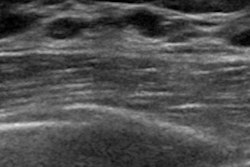Dear Artificial Intelligence Insider,
Computer-aided diagnosis software has yielded disappointing results in the past because it was tasked with interpreting images in human-like fashion but lacked the abstract senses utilized by the brain, according to a team of researchers from Brazil.
With machine-learning systems, however, it's now possible for computers to classify lesions in a manner analogous to humans, the group reported in research published online in European Radiology Experimental. The results showed a promising level of performance for characterizing solid breast masses on B-mode ultrasound images using computerized BI-RADS radiomics features.
Radiologists have traditionally determined bone age by assessing the level of ossification on hand x-rays and then comparing the results with a reference atlas. This method, though, exposes children and adolescents to ionizing radiation and is subject to high interrater and intrarater variability. In contrast, AI can estimate bone age in children and adolescents on a 3D hand MRI exam with a very high level of accuracy, according to Austrian researchers. Interestingly, their AI algorithm also performed well when adapted for use on radiographs.
German technology guru and blogger Sascha Lobo believes that radiologists must evolve if they're going to benefit significantly from the use of AI. In the new era of radiology, radiologists will need to explain, communicate, and -- where necessary -- help patients understand certain forms of data and data links, he said.
Meanwhile, according to Dr. Peter Rinck, PhD, the success of AI in radiology will depend on data validation. He explains why in his latest Maverinck column.
The medical imaging community needs to learn how to check product capability and consider conducting its own studies to evaluate the accuracy of AI algorithms, according to Dr. Nicola Strickland. In a webinar held recently by the British Institute of Radiology, the current president of the U.K. Royal College of Radiologists shared some tips for judging how well these products have been tested.
Finally, the National Health Service (NHS) in England is planning a new national laboratory that will be charged with increasing the role of AI within the NHS. The lab will be launched with 250 million pounds in funding.
Is there a story you'd like to see covered in the Artificial Intelligence Community? Please feel free to drop me a line.



















